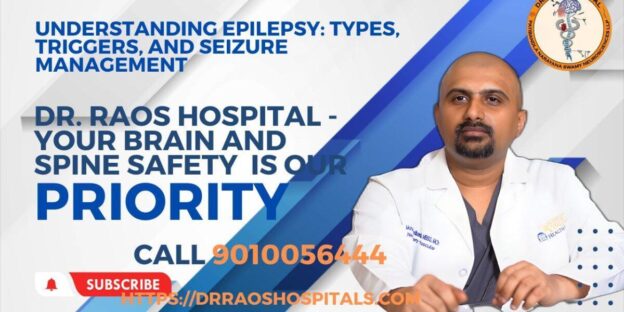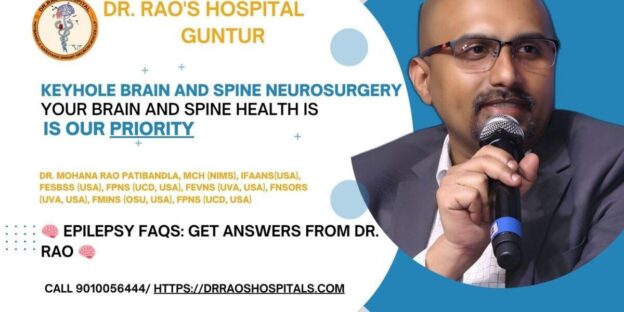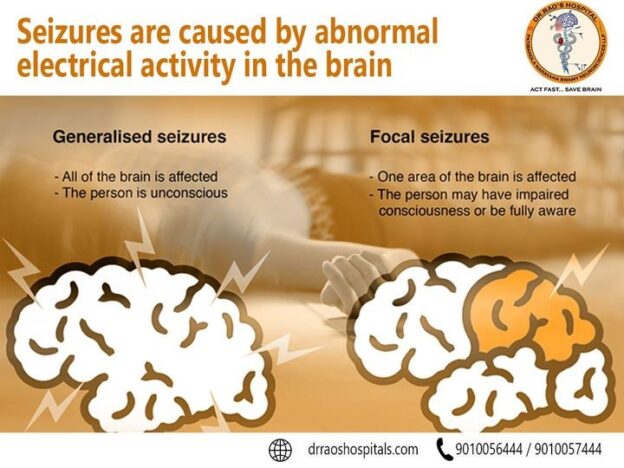Top Epilepsy Treatment & Minimally Invasive Surgery at Dr. Rao’s Hospital, Guntur
Best Hospital for Epilepsy Treatment in India
Epilepsy is a neurological disorder affecting millions worldwide. Finding the best treatment is crucial for leading a seizure-free life. Among the top facilities, Dr. Rao’s Hospital in Guntur, Andhra Pradesh, stands out for its world-class epilepsy care. This hospital is renowned for using the latest technologies and advanced medical techniques, making it a top choice for epilepsy patients across India.
Best Hospital for Epilepsy Treatment in Andhra Pradesh
Dr. Rao’s Hospital is also recognized as the best hospital for epilepsy treatment in Andhra Pradesh. With a team of highly skilled neurologists and neurosurgeons, the hospital provides comprehensive care for epilepsy patients. The facility has state-of-the-art Epilepsy Monitoring Units (EMUs), allowing for accurate diagnosis and personalized treatment plans. The hospital’s commitment to patient care and its use of minimally invasive surgery techniques make it the preferred choice for epilepsy treatment in the region.
Best Epilepsy Treatment in India
Regarding epilepsy treatment in India, Dr. Rao’s Hospital offers some of the most advanced options available. The hospital specializes in minimally invasive neurosurgery, which ensures faster recovery times and fewer complications. This approach is particularly beneficial for epilepsy patients, as it reduces the risks associated with traditional surgery. Dr. Rao’s Hospital also offers comprehensive epilepsy management, including medical therapy, surgical options, and lifestyle counseling, ensuring that each patient receives the best possible care.
Best Epilepsy Treatment in Guntur
In Guntur, Dr. Rao’s Hospital is the leading center for epilepsy treatment. Patients from across the state and beyond come to this hospital seeking relief from their seizures. Dr. Mohana Rao Patibandla’s skilled team at the hospital specializes in treating complicated epilepsy cases. Using cutting-edge technology and minimally invasive spine surgery techniques allows the hospital to provide effective treatment while minimizing the impact on the patient’s life.
Best Doctor for Epilepsy Treatment in India
Dr. Mohana Rao Patibandla is widely regarded as one of the best doctors for epilepsy treatment in India. His neurosurgery expertise and his compassionate approach to patient care make him a trusted name in the field. Dr. Rao’s experience with minimally invasive techniques allows him to offer patients safer and more effective treatment options. Whether it’s a complex epilepsy surgery or a simple medical intervention, patients can rely on Dr. Rao for expert care.
Top 10 Epilepsy Doctors in India
India is home to many renowned epilepsy specialists, and Dr. Mohana Rao Patibandla is among the top 10 epilepsy doctors in the country. His dedication to improving the lives of epilepsy patients, along with his expertise in advanced surgical techniques, places him at the forefront of epilepsy treatment in India. Dr. Rao’s commitment to staying updated with the latest advancements in the field ensures that his patients receive the most current and effective treatments.
Epilepsy Treatment Cost in India
The cost of epilepsy treatment in India varies depending on the type of treatment required. However, Dr. Rao’s Hospital is known for providing high-quality care at an affordable cost. The hospital’s focus on affordable medical tourism has become a popular destination for international patients seeking cost-effective epilepsy treatment. Patients can expect transparent pricing and a range of options to suit their financial needs without compromising the quality of care.
Permanent Treatment for Epilepsy in India
For many patients, the goal is to find a permanent solution to epilepsy. Dr. Rao’s Hospital offers advanced surgical options that significantly reduce or even eliminate seizures in some patients. Procedures such as minimally invasive neurosurgery and targeted resections are available for those seeking a permanent treatment option. The hospital’s comprehensive approach to epilepsy care ensures that each patient’s treatment plan is tailored to their needs, offering the best chance for a successful outcome.
Free Treatment and Surgery for Epilepsy Patients
Understanding the financial burden that epilepsy treatment can place on patients, Dr. Rao’s Hospital is committed to making care accessible to everyone. The hospital participates in various programs that offer free or subsidized treatment and surgery for epilepsy patients. This commitment to affordability ensures that even those with limited resources can receive the care they need to manage their epilepsy effectively.
Best Epilepsy Treatment Center in India
Dr. Rao’s Hospital is recognized as one of the best epilepsy treatment centers in India. The hospital’s comprehensive care approach includes everything from diagnosis to post-surgery rehabilitation. With a dedicated epilepsy center, the hospital provides specialized care for both adults and children with epilepsy. The availability of the latest diagnostic tools and treatment options ensures that patients receive the best possible care.
Epilepsy: What It Is, Causes, Symptoms, and Diagnosis
Epilepsy is a neurological disorder characterized by recurrent, unprovoked seizures. Causes can range from genetic factors to brain injuries. Symptoms vary but often include temporary confusion, staring spells, and uncontrollable jerking movements. Diagnosis typically involves a combination of neurological exams, imaging tests, and electroencephalograms (EEGs). Early diagnosis and treatment are crucial for managing the condition effectively.
Best Hospital for Epilepsy Treatment
Dr. Rao’s Hospital is widely considered the best hospital for epilepsy treatment due to its comprehensive care approach, advanced technology, and expert medical team. The hospital’s focus on minimally invasive surgery makes it a leader in epilepsy treatment, offering patients the best chance for a seizure-free life.
Epilepsy Monitoring and Surgery
Effective epilepsy treatment often requires continuous monitoring, which is available at Dr. Rao’s Hospital’s state-of-the-art Epilepsy Monitoring Unit (EMU). The hospital also specializes in epilepsy surgery, including minimally invasive procedures that reduce recovery time and improve outcomes. Continuous monitoring allows for precise treatment adjustments, ensuring optimal patient care.
Epilepsy Patients Can Lead a Seizure-Free Life
With the proper treatment, many epilepsy patients can achieve long-term seizure control and lead an active, everyday life. Dr. Rao’s Hospital’s multidisciplinary approach ensures patients receive all the support they need, from medical therapy to surgical interventions, to achieve the best possible outcomes.
Top Epilepsy Doctors in India
In addition to Dr. Rao, India is home to many top epilepsy doctors who contribute to the country’s reputation as a leading destination for epilepsy treatment. These doctors collaborate with top hospitals like Dr. Rao’s Hospital to provide comprehensive care for epilepsy patients.
Conclusion
Dr. Rao’s Hospital in Guntur, India, stands out as one of the best facilities for epilepsy treatment in the country. With its focus on minimally invasive neurosurgery, affordable medical tourism, and a commitment to patient care, the hospital offers patients the best chance for a seizure-free life. Whether seeking the best epilepsy treatment in Andhra Pradesh or across India, Dr. Rao’s Hospital is a top choice for comprehensive, expert care.
Dr. Rao’s Contact Information:
- Phone: 9010056444, 9010057444
- Email: info@drraoshospitals.com
- Address: Old Bank St, GV Thota, beside AK Biryani Point, Guntur, Andhra Pradesh 522001
- Website: Dr. Rao’s Hospital











